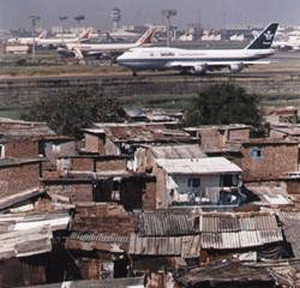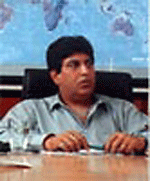India Agents Big Bangkok Show
 The
33rd Annual Convention of Air Cargo Agents Association of India (ACAAI)
kicks off next Saturday December 3, 2005 promising to move the 360 member
organization even further into the world cargo mainstream as India emerges
as a regional cargo hub. The
33rd Annual Convention of Air Cargo Agents Association of India (ACAAI)
kicks off next Saturday December 3, 2005 promising to move the 360 member
organization even further into the world cargo mainstream as India emerges
as a regional cargo hub.
The last Air Cargo Agents Association of
India convention in Kuala Lumpur had seen important pillars of the cargo
industry – the airlines and the forwarders – talking to each
other and listening to several mutually held problems and concerns.
 The
air cargo industry has seen phenomenal growth in the past year as the
convention venue at The Imperial Queens Park Hotel in Bangkok expects
record turnout for this fourth consecutive meet outside the country. The
air cargo industry has seen phenomenal growth in the past year as the
convention venue at The Imperial Queens Park Hotel in Bangkok expects
record turnout for this fourth consecutive meet outside the country.
“Looking at issues that have come
up to confront the boom,” is one way to describe a core topic at
these meetings although for the record the published title is “Air
Logistics —New Markets – New Values.”
To begin with, the Air Cargo Agents Association
of India has a brand new set of office-bearers for 2005-06, all of them
eager and willing to get on with the task at hand: the success of the
Bangkok convention. Leading the team is Vipin Vohra, president of the
association.
The other members of his team are: R Vijay
Kondath, vice-president, Bharat J Thakkar, honorary secretary-general,
Keshav R Tanna, honorary treasurer.
ACAAI’s managing committee comprises
S L Sharma, Anil Vazirani, Hemant Bhatia, Sunil Arora, J Krishnan, Lalit
Seth and Ajit Dutta.
ACAAI’s move to once again hold the
convention outside the country is an indication of the association’s
confidence to network with the world and expose the members to the trends
and influences beyond India’s boundaries.
It is, perhaps, also appropriate that the
convention is being held in Bangkok because it will provide the right
platform for the Indian air cargo sector to showcase its potential to
the world.
Over the last few years, the air cargo industry
has gained not only in strength but also in numbers.
It is in such a boom-time situation, that
the ACAAI will be holding its convention.
While rapid changes are taking place in
the sector, there are areas that still need to be looked into.
The government has been playing a pro-active
role. As Vipin Vohra, president of ACAAI, mentioned specifically about
EDI:
“The views in the ministries regarding
EDI, etc. are very positive.
 “The
India government is determined to start the whole EDI project. “The
India government is determined to start the whole EDI project.
It is really being pushed from the top.”
For its part, the air cargo community has
been more than willing to accept the changes.
However, there are still a few sore points
amongst several of the ACAAI members.
The ACAAI Convention will offer the opportunity
to get answers from ministers and senior bureaucrats, who will be attending
the convention.
Questions concerning surcharges and service
taxes are sure to top the agenda.
The business sessions at ACAAI as proposed
will see a dynamic exchange of views.
With several experts from the industry participating
along with more than 400 expected at this event, there will certainly
be plenty of room on the agenda for a fair and in depth exchange of views.
The hope is that ultimately, ACAAI members
as well as those in authority will be able to formulate the moves the
air cargo sector will take in the years to come.
More than these issues, ACAAI would like
to see changes on the ground.
“Infrastructure,” as Vohra mentioned,
“is woefully inadequate.”
“If India has to make its mark as
a regional hub, the facilities have to be improved.”
“Last year, the ACAAI convention witnessed
the nurturing of active collaborations between freight forwarders and
airlines.
“The time is indeed right for these
collaborations to consolidate and bear fruit.
“Only then will the country be able
to position itself at the center of the world economy.”
(T Ghosh)
ACAAI 33rd Annual Convention at Bangkok, Thailand at "The Imperial
Queen’s Park Hotel” from December 3 - 6 2005.
More info: ACAAI Secretariat acaai@csi.co.in
Or The Air Cargo Agents Association of India
28-B, Nariman Bhavan, Nariman Point, Mumbai 400021.
Tel: 022-22021923 / 22025584
Fax: 022-22824029
Development of India as a Regional Cargo Hub
 Vipin
Vohra, President, the Air Cargo Agents Association of India (ACAAI), talks
to FlyingTypers about the issues that will be the main focus of the Bangkok
Convention Vipin
Vohra, President, the Air Cargo Agents Association of India (ACAAI), talks
to FlyingTypers about the issues that will be the main focus of the Bangkok
Convention
FT: What will be your focus
for the Bangkok ACAAI convention?
Vipin Vohra: The convention
is the highpoint of our activity throughout the year.
At Bangkok, there will be a lot of issues, which we are going to focus
on at the ACAAI convention.
One of the major issues will concern the development of India as a regional
cargo hub.
We will also discuss infrastructure issues.
What we basically need to have is the agents’ warehouses close to
all the airports–something akin to the cargo villages around the
world.
The infrastructure right now at the airports is very inadequate.
The way the cargo sector is growing, unless we look at it seriously, things
will be worse after a few years.
The other issue that I wish to raise this time is the question of merging
of all surcharges into freight. India was the first country, which started
that but surcharges are increasing by the day.
The total amount that goes to make up the surcharges are not commissionable.
All the organizations like the Federation of Asia Pacific Agents Association
(FAPAA), FIATA, etc are gearing up for this issue.
We are talking to the airlines to merge these surcharges into one.
Earlier, the surcharges used to be introduced for short periods of time
but now surcharges have become part of the game.
The other issues concern documentation, Electronic Data Interface (EDI),
etc.
Right now, every department is doing the documentation differently.
The Airports Authority has a different set of documentation rules than
the Customs department. Initially, some two years ago when the EDI process
started we were told that it would bring in a paperless regime.
If you see it now, we have added two more papers to the whole process.
In addition, we will also be discussing the service tax and other issues.
The views, incidentally, in the ministries regarding EDI, etc. are very
positive.
The government is determined to start the whole EDI project.
It is really being pushed from the top.
The minister of civil aviation, Praful Patel and the minister of commerce,
Kamal Nath are invited.
We will also be requesting civil aviation secretary Ajay Prasad and others
to Bangkok for the convention.
Last time, in the Kuala Lumpur convention, the secretary-civil aviation,
had come and so had some other senior government functionaries.
Every year, we get participants from the corporate world.
This year too, we will get some top people from airlines.
FT: Over the last few years,
the air cargo sector has seen a number of multinational companies coming
in. Has ACAAI approached these companies to join the association?
VV: Any multinational that
has applied for membership, has been welcomed into our association.
We have representatives from international giants like BAX and UTi.
We have been trying our best to bring others as well into our association.
The multinationals are a reality now.
Ten years ago, when the multinationals started coming in, there was some
resistance amongst our membership who felt that they would eat away all
the business of the Indian cargo agents.
But that has not been the case.
At the end of the day, our Indian companies are both surviving and growing.
The multinationals are a reality now and we have to accept that reality.
FT: Do you feel that if
you were to hold the convention in India, there would be quite a number
of participants from the government bodies and that perhaps the association’s
views would be heard more clearly?
VV: This year, we really
wanted to have the convention in India.
We usually have our convention in October/November, which incidentally
is the peak season for tourists.
There are a few issues like availability of hotel rooms —the association
needs 250-260 rooms for three or four nights—hotel tariffs, etc.,
which are very important for us.
At that time of the year in India, the room tariffs hotels are demanding
are too high for us.
Our idea is to get a large number of people to attend the convention.
If the participation fees are too high, the number attending will be small.
We also have to consider domestic airfares.
They too are high.
The fares to Colombo, Dubai and Kuala Lumpur—that is where our last
conferences were held—were lower than those to Indian destinations.
That is one of our main considerations.
What we are trying to do this time is to hold a one-day seminar with senior
government and industry participation sometime in the middle of the year.
That is the proposal I am going to put forward to the members in Bangkok.
The idea is to get our views across to the concerned authorities.
FT: How do you see air cargo
shaping up?
VV: Air cargo will boom
in the coming years.
There are a number of airlines coming into India. From the Delhi market
alone, the capacity is going to increase additionally by 3,000-3,500 tons
per month by the end of 2005.
The new carriers will all have belly space. Additionally, the international
airlines will not only be starting service to and from India but also
are utilizing larger cargo bearing aircraft.
That will also mean more tonnage for cargo.
The more the capacity, the better it will be for the trade.
The rates will come down with the capacity going up.”
|



